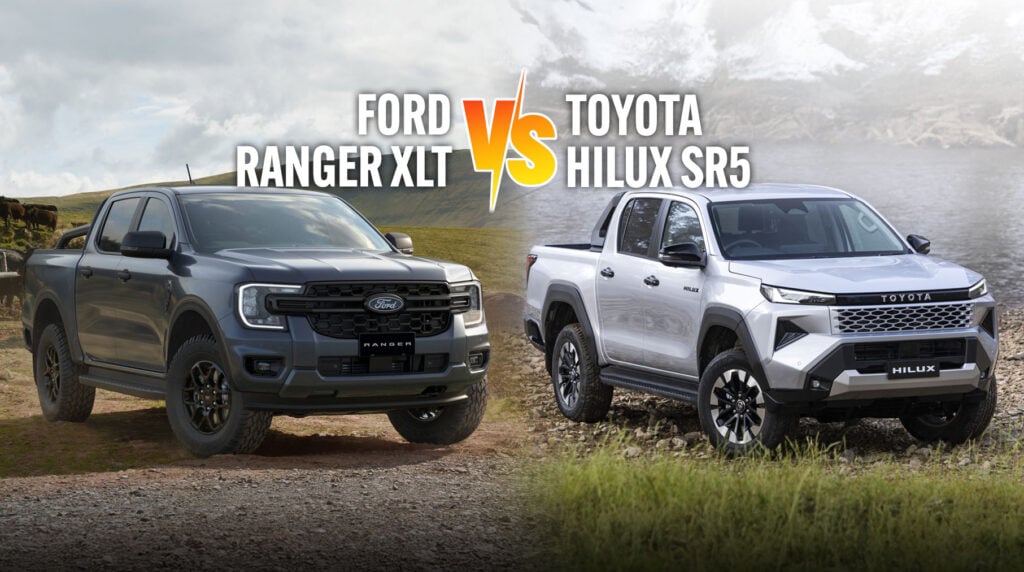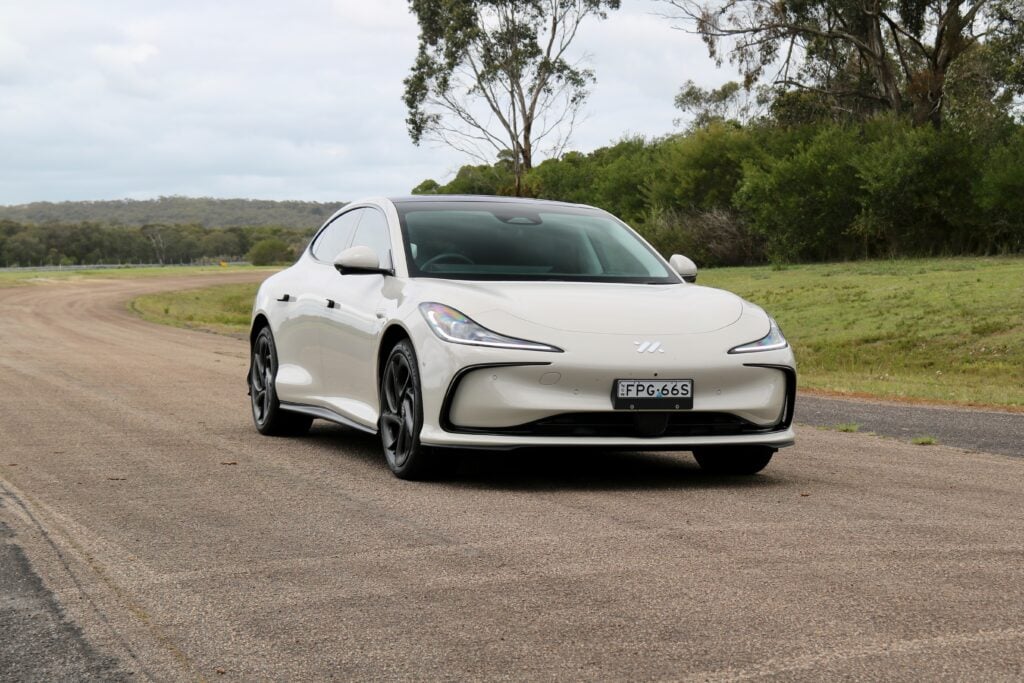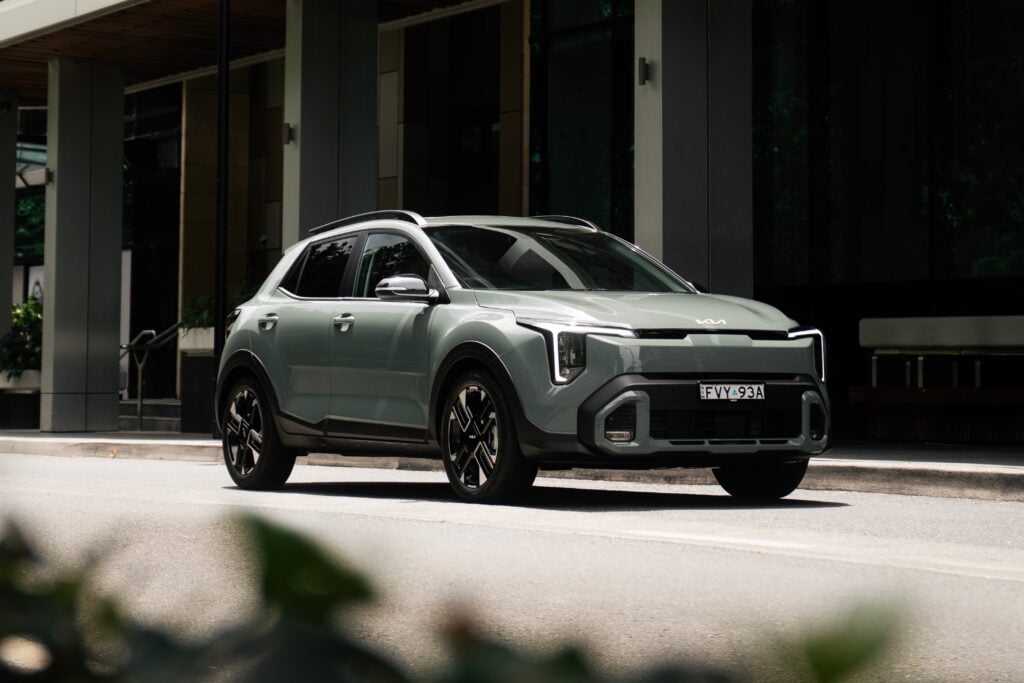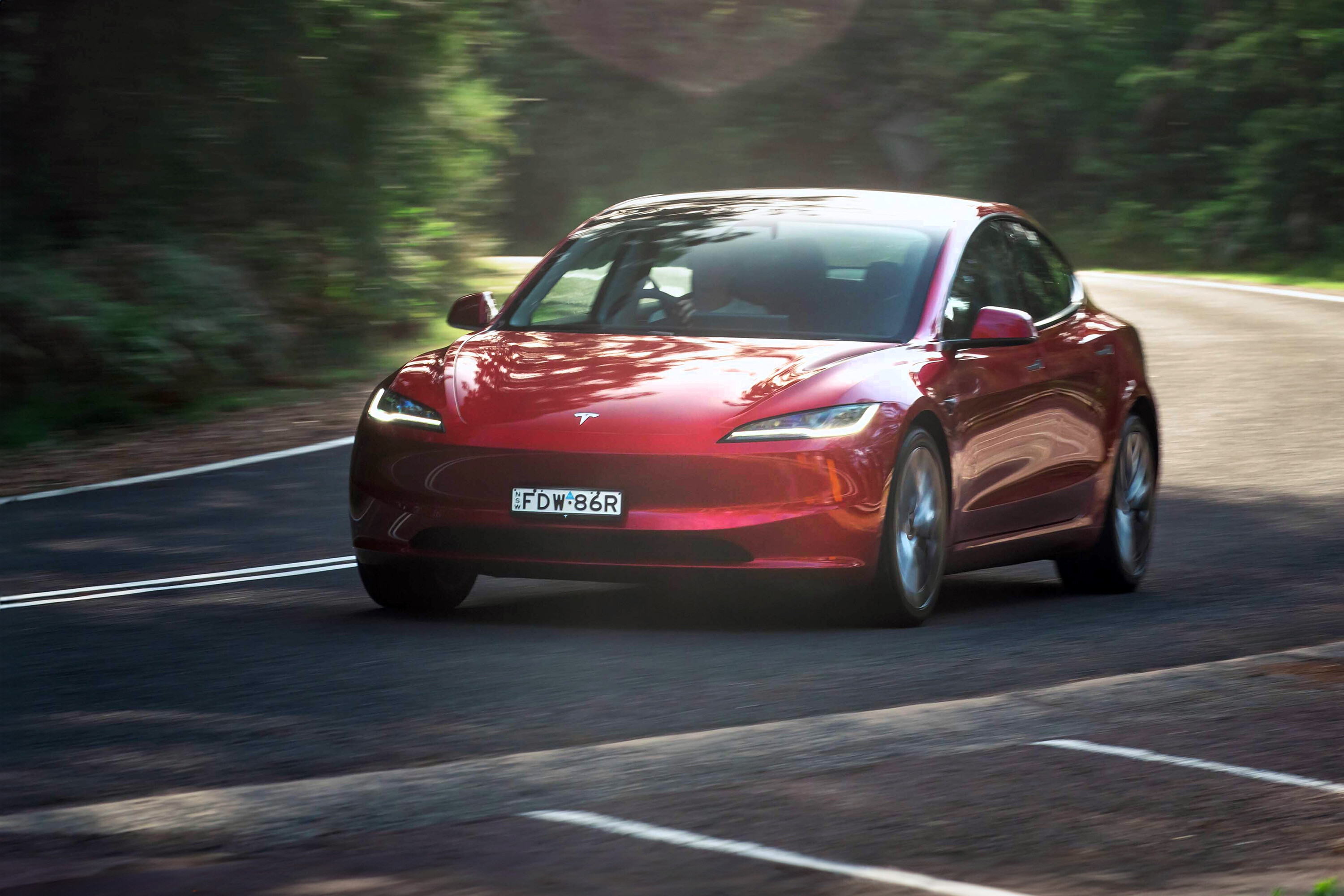
Score breakdown
Things we like
- RWD transcends base-model status with quality and features
- Strong, effortless performance
- Cabin noise insulation
- Spacious cabin and plentiful small- and large-item storage
Not so much
- Ride quality improved but still patchy
- Some rivals more fun to drive
- An HUD would still be beneficial
- No spare tyre or repair kit
The Tesla Model 3‘s SUV spin-off, the Model Y, has whizzed past it in local and global sales, but the sedan remains a significant contributor to the tech company’s automotive success.
And the number of rivals to have emerged since the electric sedan debuted in 2017 continues to increase.
In Australia alone we now have the BMW i4, BYD Seal, Hyundai Ioniq 6, and Polestar 2.
Tesla has wisely chosen against complacency and given its most affordable vehicle its first major overhaul.
The 2024 Model 3 features substantial revisions inside and out, though do they all bring improvements to what has been one of our favourite electric cars?
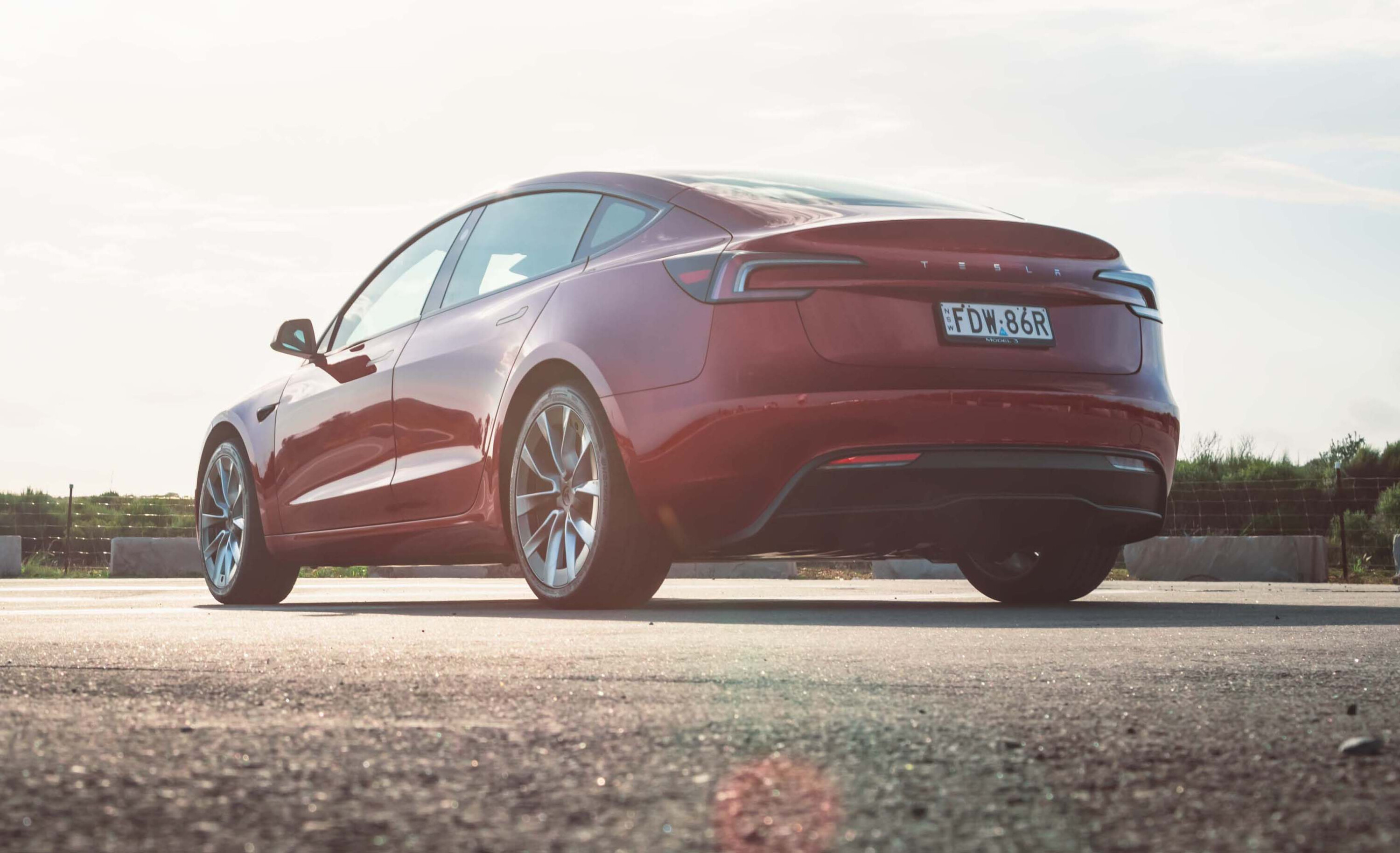
JUMP AHEAD
- How much is it, and what do you get?
- How do rivals compare on value?
- Interior comfort, space and storage
- What is it like to drive?
- What is the range like?
- How safe is it?
- Warranty and running costs
- VERDICT
- Specifications
How much is it, and what do you get?
Pricing for the Model 3 has shifted around a fair bit over the past year or so, and was $57,400 as recently as mid year. It currently starts at $61,990 for the entry-level ‘RWD’ we’re testing here.
A mid-range Long Range costs from $71,900, bringing extra range plus dual motors for faster, all-wheel drive performance.
A Performance flagship variant will return in 2024.
You can see from the below list that even the base Model 3 is comprehensively equipped. Additions for the 2024 update included ventilation for the front seats, ambient lighting, rear-cabin touchscreen, and acoustic rear glass.
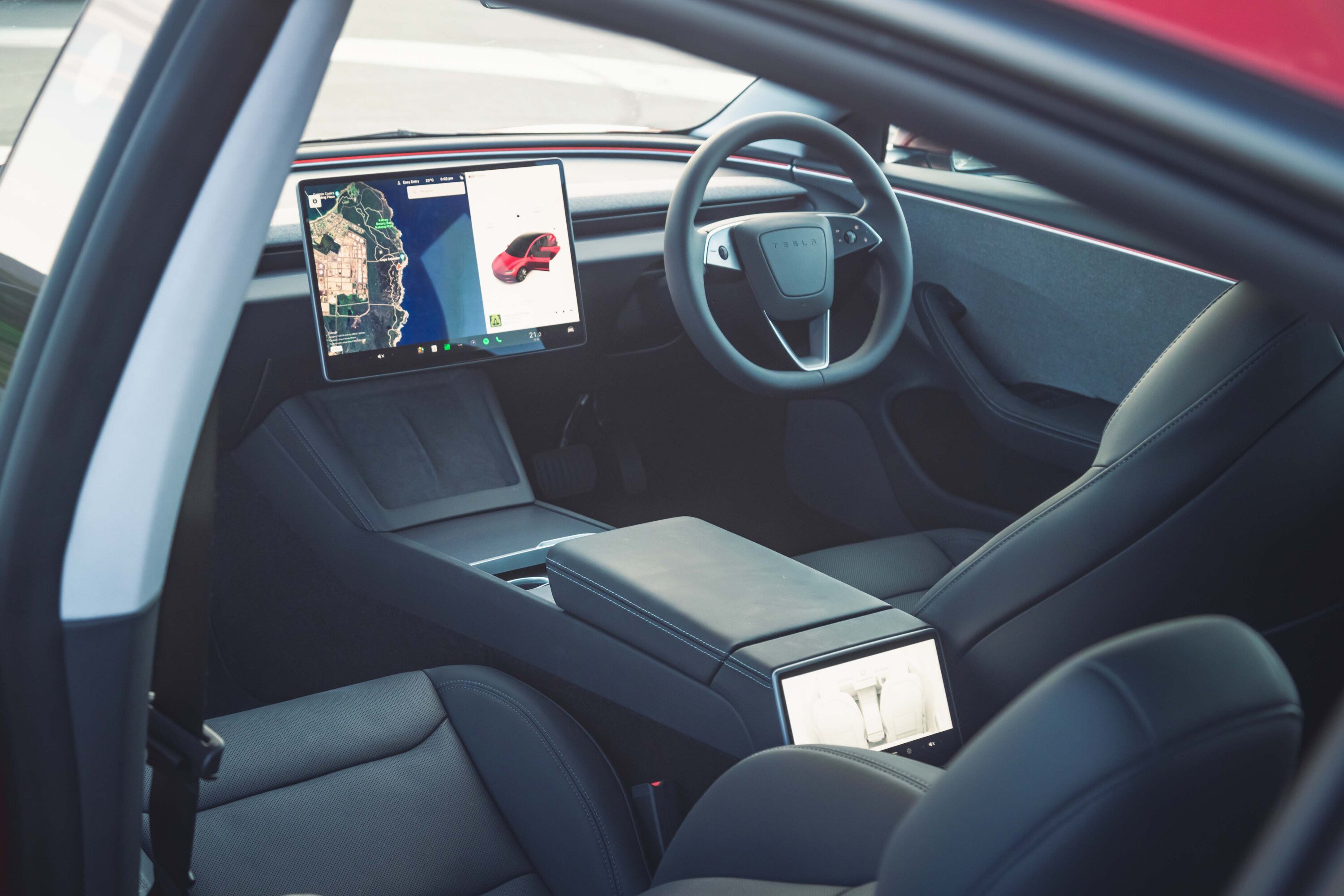
White remains the only no-cost paint option. There’s a $1500 charge for Solid Black or Deep Blue, while Stealth Grey ($2300) and Ultra Red ($2600) are the newest colours.
Optional ($1800) 19-inch wheels are again offered but with a different ‘Nova’ design, as an alternative to the standard 18s.
Two autonomous-drive option packages continue to be offered, and we continue to advise that buyers think carefully about the value of these as not all features are enabled or even useable in Australia.
Although the Model 3 is back above $60,000, the RWD model is excellent value for money.
| 2024 Tesla Model 3 RWD features | |
|---|---|
| 18-inch u2018Photonu2019 aero covered alloy wheels | Fixed tinted panoramic glass roof |
| Animal hide-free black interior | Acoustic glass (front, side and rear) |
| 15.4-inch touchscreen with over-the-air (OTA) software update capability | Ambient lighting dashboard and door strips (200+ colour combinations) |
| 8.0-inch rear passenger climate and entertainment touchscreen | u2018Tesla Visionu2019 camera-only u2018Basic Autopilotu2019 active safety assistance features |
| Built-in Google Maps with automatic Supercharging stop planning | Reversing camera with blind-spot view side cameras |
| Music and video streaming apps, arcade games, Bluetooth, and voice control | Heated and ventilated front seats |
| Tesla mobile app connectivity with ultra-wideband (UWB) support for phone key | Heated rear seats |
| Standard Connectivity for up to eight years, Premium Connectivity trial for first 30 days | Heated steering wheel |
| Built-in Dashcam and Sentry Mode recording (128GB USB stick included) | Electrically adjustable driver and front passenger seat |
| Nine-speakers with amplifier | Full LED headlights with auto high beam and integrated fog lights |
| Dual Qi wireless charging pads | Full LED tail-lights with rear fog lights |
| 65-watt USB-C charging ports | Auto power folding, dimming, heated wing mirrors |
| Dual-zone climate control with hidden front and rear air vents, Keep Climate On, camp mode and dog mode | Power tailgate |
| Pedestrian warning u2018Boomboxu2019 external speaker | Camera-based automatic wipers |
| Flush exterior door handles with matte black exterior trim | |
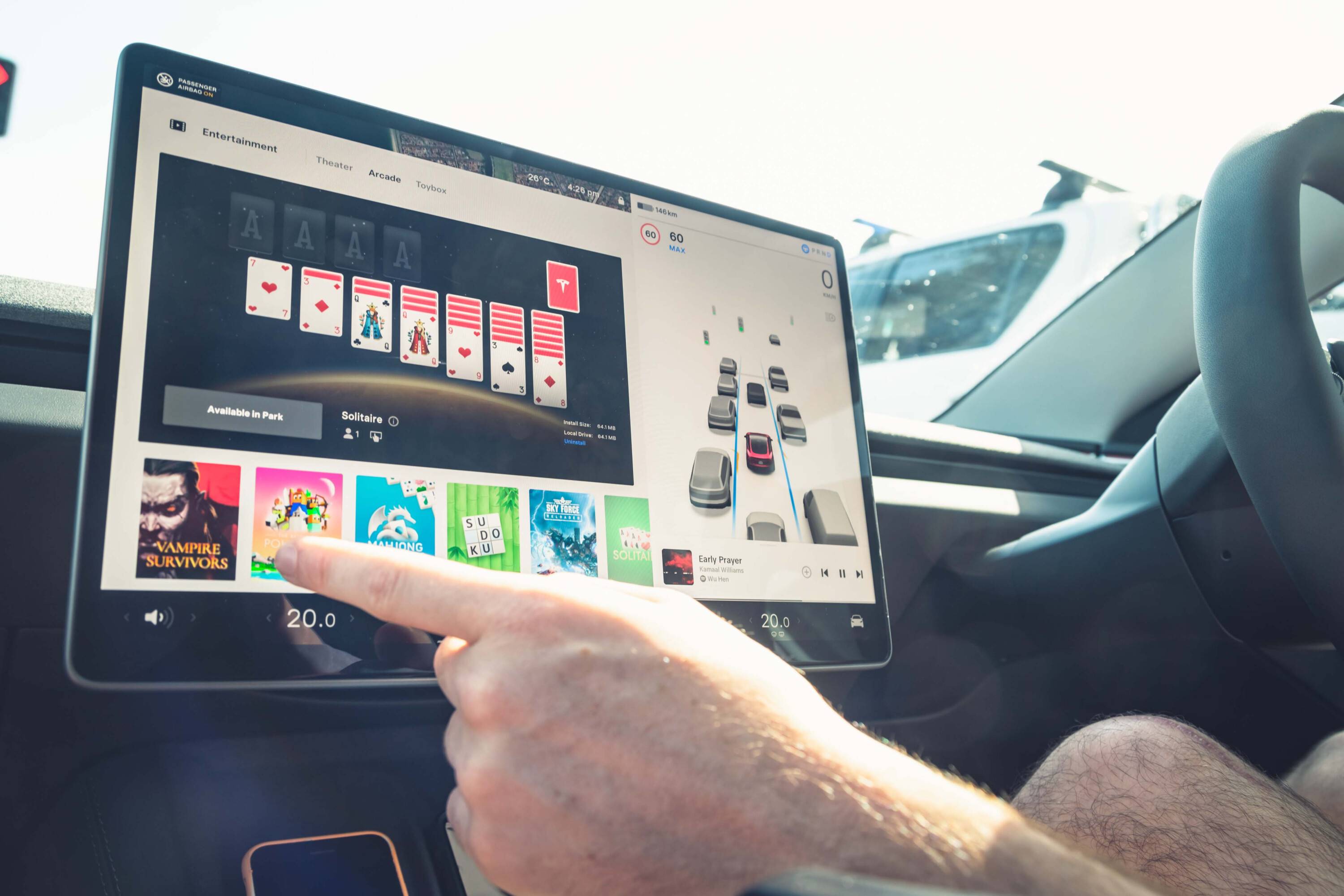
How do rivals compare on value?
The Model 3‘s most direct rivals are the BYD Seal, Hyundai Ioniq 6, and Polestar 2, while you could also consider BMW’s i4 in the mix if comparing higher grades of the Tesla.
We’ve yet to drive the Seal on local roads for full assessment, but the other three electric sedans are all appealing offerings we can easily recommend.
The Ioniq 6 starts from $65,900, the Polestar 2 begins at $67,400, and the i4’s entry cost is $85,900 before on-roads. BYD’s Seal begins the lowest, from $49,888.
The Polestar, Hyundai and BMW each has the odd standard feature here and there that’s an advantage over the Tesla, though ultimately the Model 3’s combination of low price and inclusive features is unmatched.
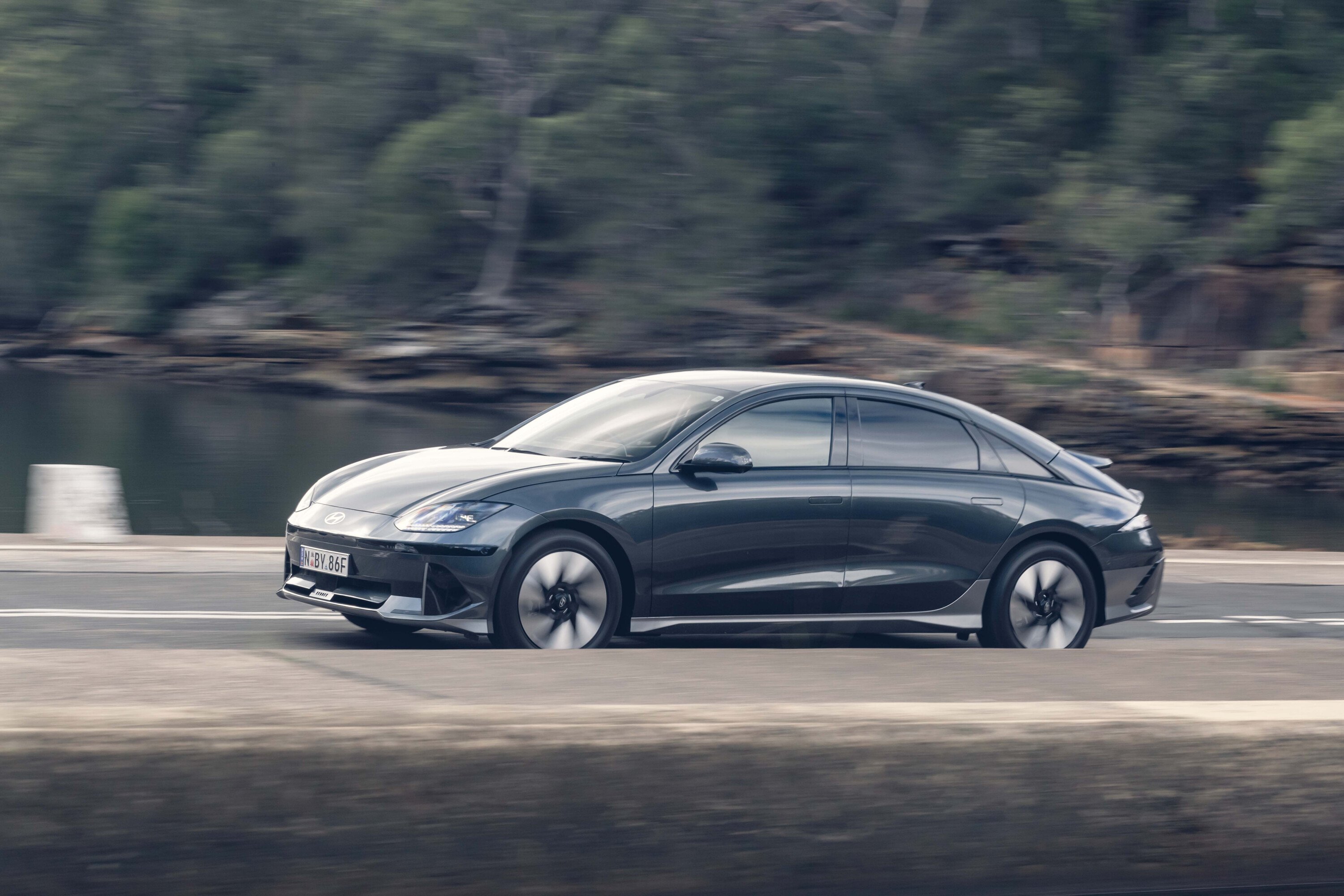
Interior comfort, space and storage
Tesla’s minimalist theme doesn’t change for the MY24 Model 3; in fact, it goes further, with the removal of steering wheel stalks.
The cabin layout is largely the same but there’s a complete revamp of the presentation.
Interior quality is ramped up, with smart details including a large swathe of cloth applied to a big section of the door and the same material used for a panel running along the top of the dash.
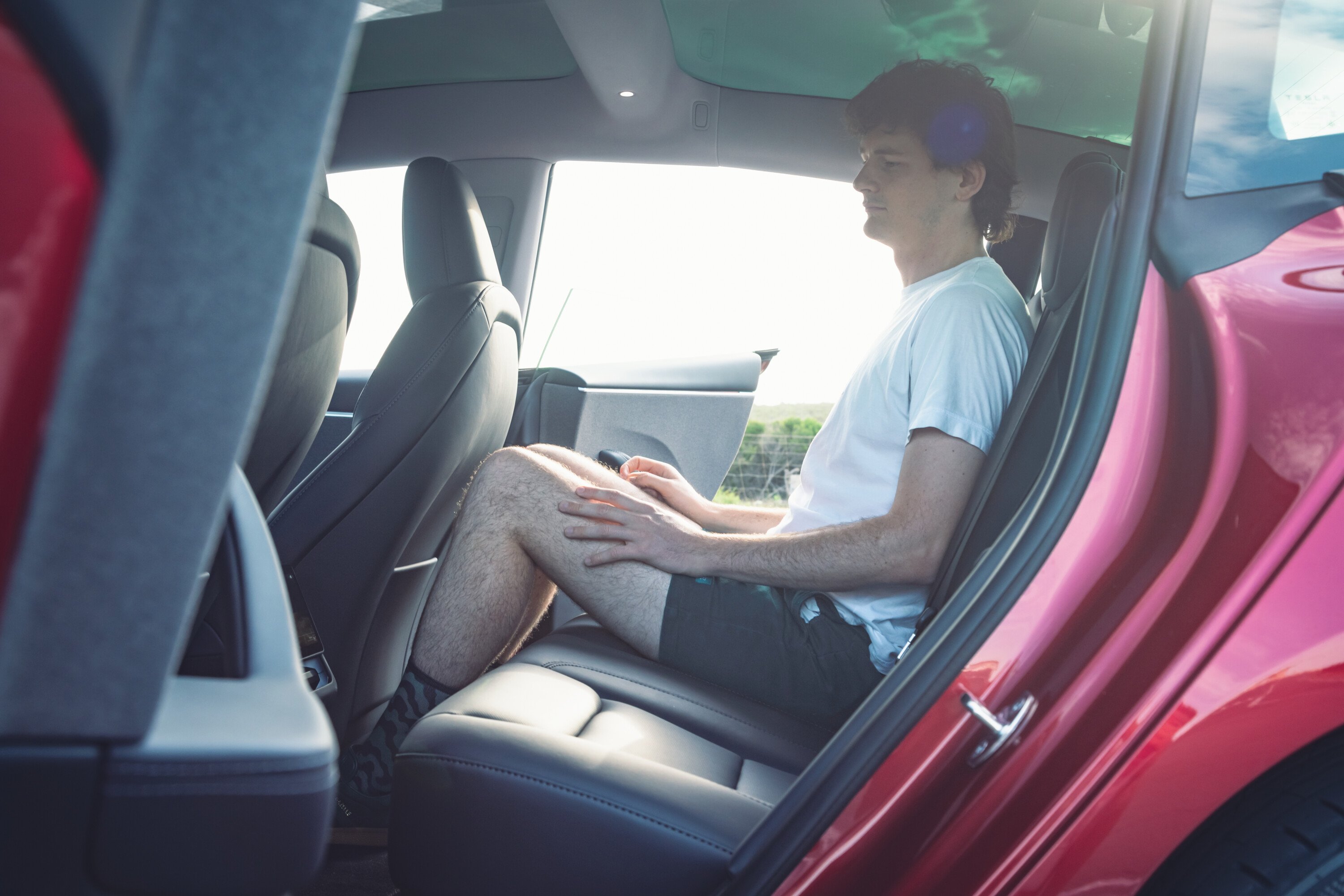
There are soft, yielding plastics aplenty, and a colour-customisable LED strip now arcs from the top of the doors and around the dash cowl.
Tesla says its central 15.4-inch display – again the command centre for vehicle functions and information, not just merely entertainment – is now thinner, brighter, faster, and with an enlarged active area.
Cabin-storage options continue to be plentiful, with generously sized door pockets, dual (angled) smartphone charging trays, glovebox (again opened via the touchscreen), and a new and silvery centre console that offers lots of hidden storage and a couple of cupholders below its sliding covers.
Rear-seat passengers receive extra attention for MY24, not least with the addition of an 8.0-inch touchscreen. There’s only fan control with no temperature adjustment, though passengers may well be too distracted to notice with the likes of Netflix, Disney and YouTube on offer (with headphones connectivity, thankfully). Two USB-C ports are included.
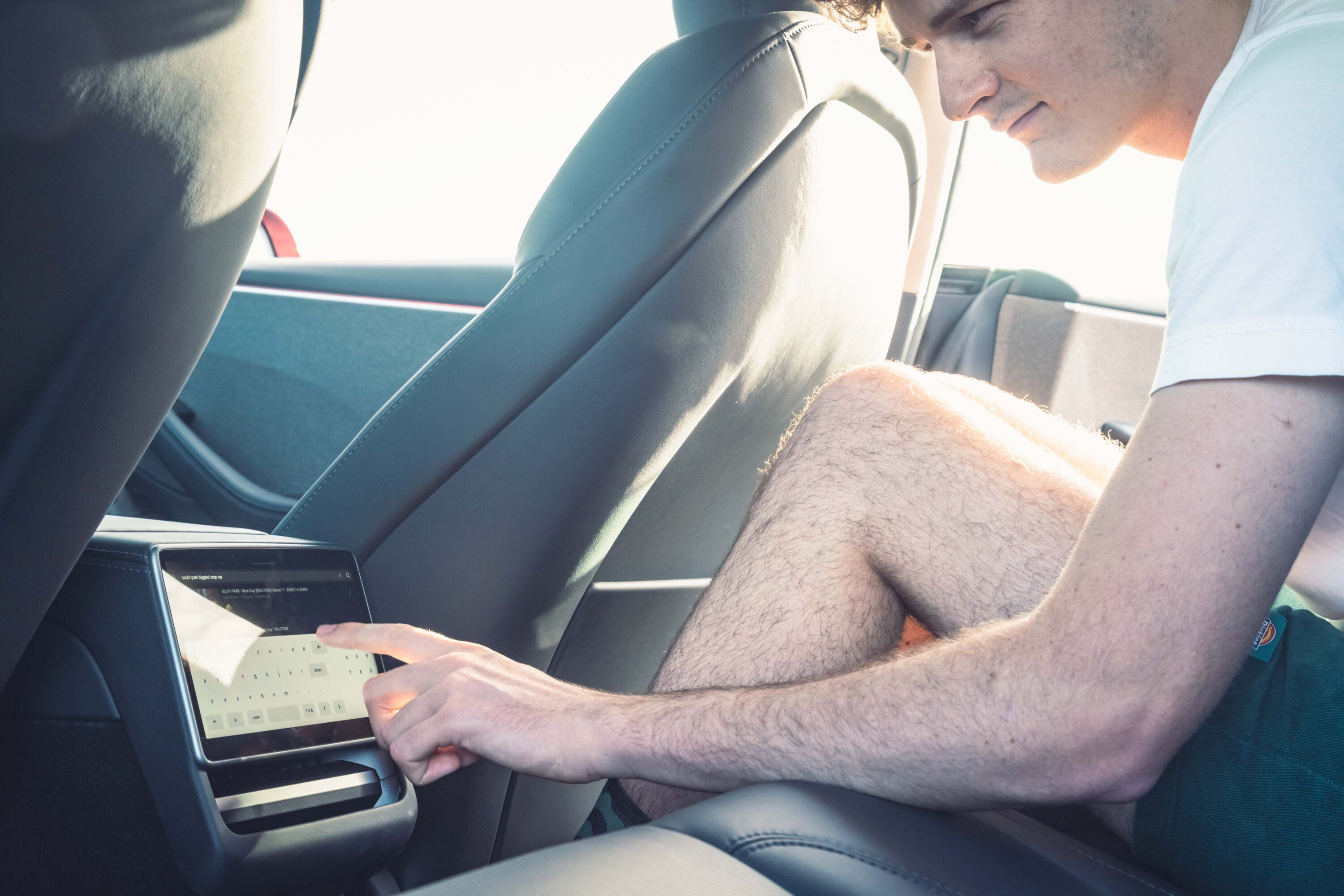
The rear seats are said to have been reprofiled for improved posture, and they do seem better.
Longer-legged occupants are still likely to find under-thigh support lacking to varying degrees – and find their heads close to the glass roof – but the angles of both the cushion and seatback are well judged and knee space is in decent supply.
Rear door pockets are almost as large as those up front, both seatbacks incorporate elasticated ‘map’ flaps, and there’s a centre armrest (with cupholders) that’s easily missed as it’s the entire mid-section of the backrest complete with integrated headrest.
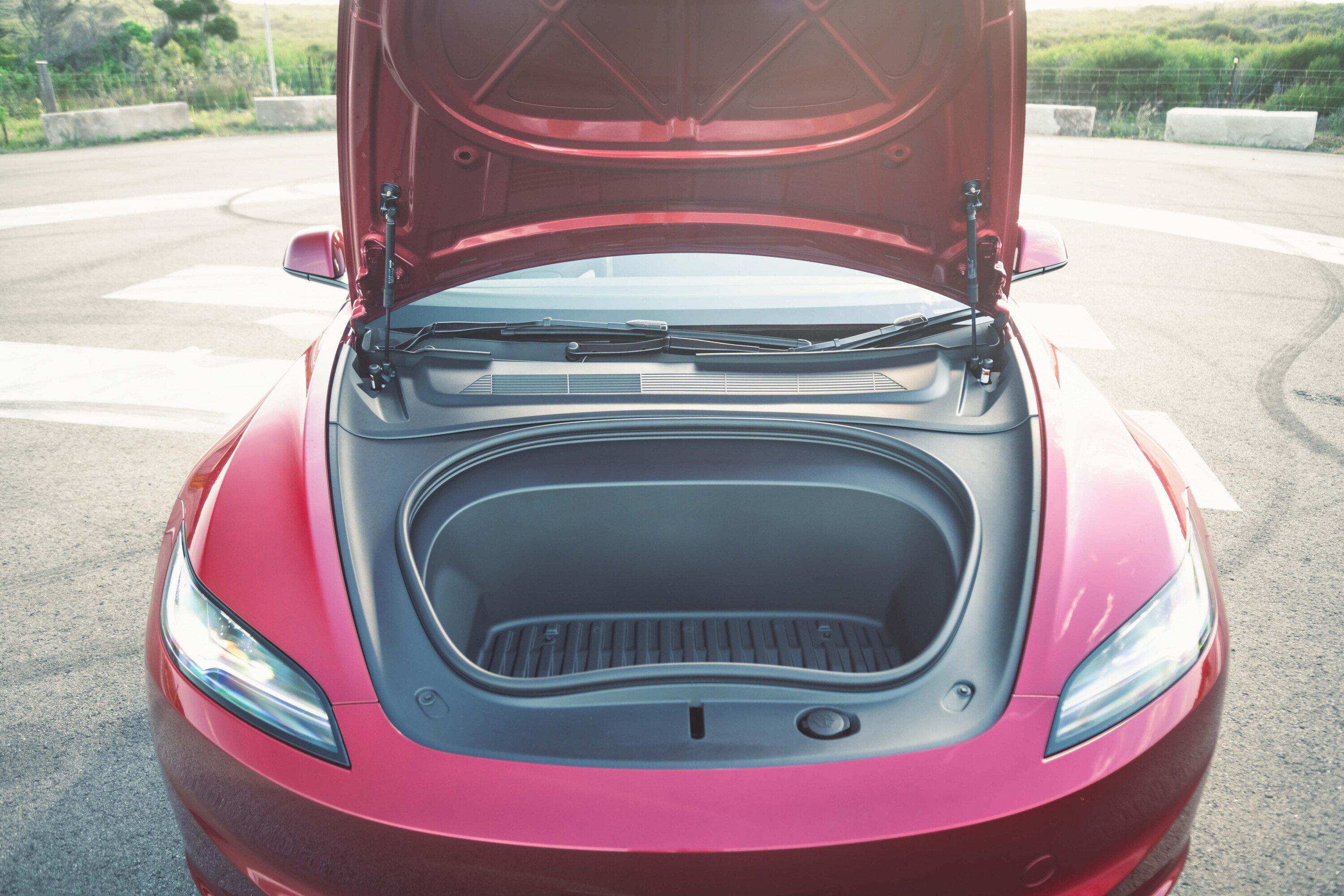
The Model 3’s electric bootlid can be opened via the touchscreen or Tesla app.
A bootlid that almost opens like a liftback – just with the rear window section remaining in place – helps create good access to the luggage compartment. It’s deep and reasonably wide, with an underfloor storage well again providing useful extra space.
The seatbacks fold in a 60-40 split, though have to be lowered from the rear cabin.
With no spare wheel or even repair kit, any punctures require an inconvenient call to Tesla roadside assistance (and subsequent waiting time).
It also seems the designer behind the new 19-inch wheel completely forgot that tyres need to be inflated/deflated occasionally – an air hose doesn’t fit on the tyre valve without a section of the wheel being removed (and it was sufficiently difficult that we gave up with fear of breaking the wheel).
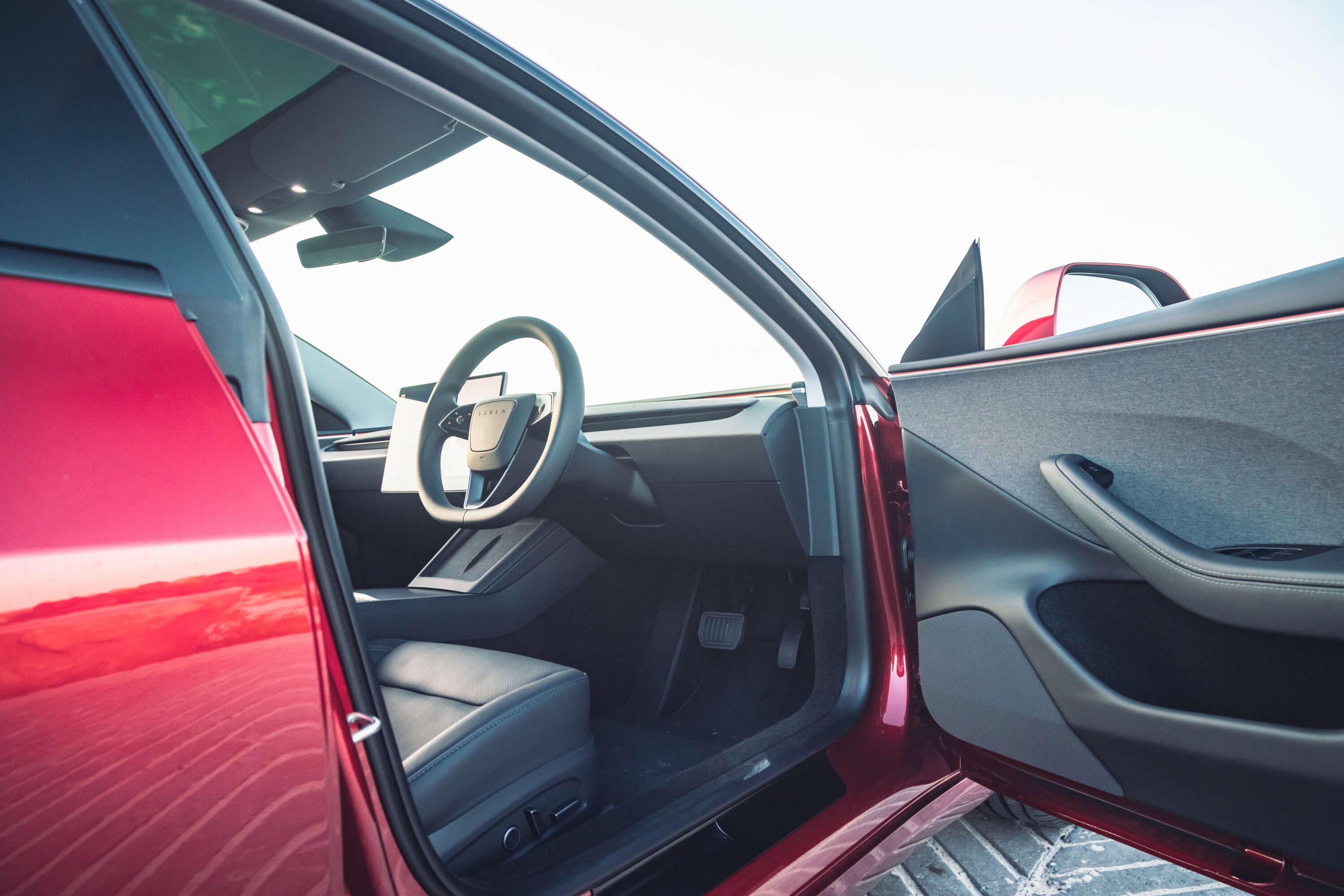
What is it like to drive?
Indicator buttons on a steering wheel isn’t a new idea – Ferrari did that more than a decade ago with the 458 Italia.
With left and right indicators on the corresponding sides of the wheel, however, they were more intuitive to use than the Model 3’s buttons that are positioned together on the left side (of a new-look wheel) .
While you get used to them, Tesla’s approach wouldn’t go into The Book of Great Car Ergonomics.
The seats, might, though. There’s plenty of electric adjustment including lumbar for the lower back, the cushion is long, and the padding of the whole seat is in that Goldilocks ‘just right’ zone.
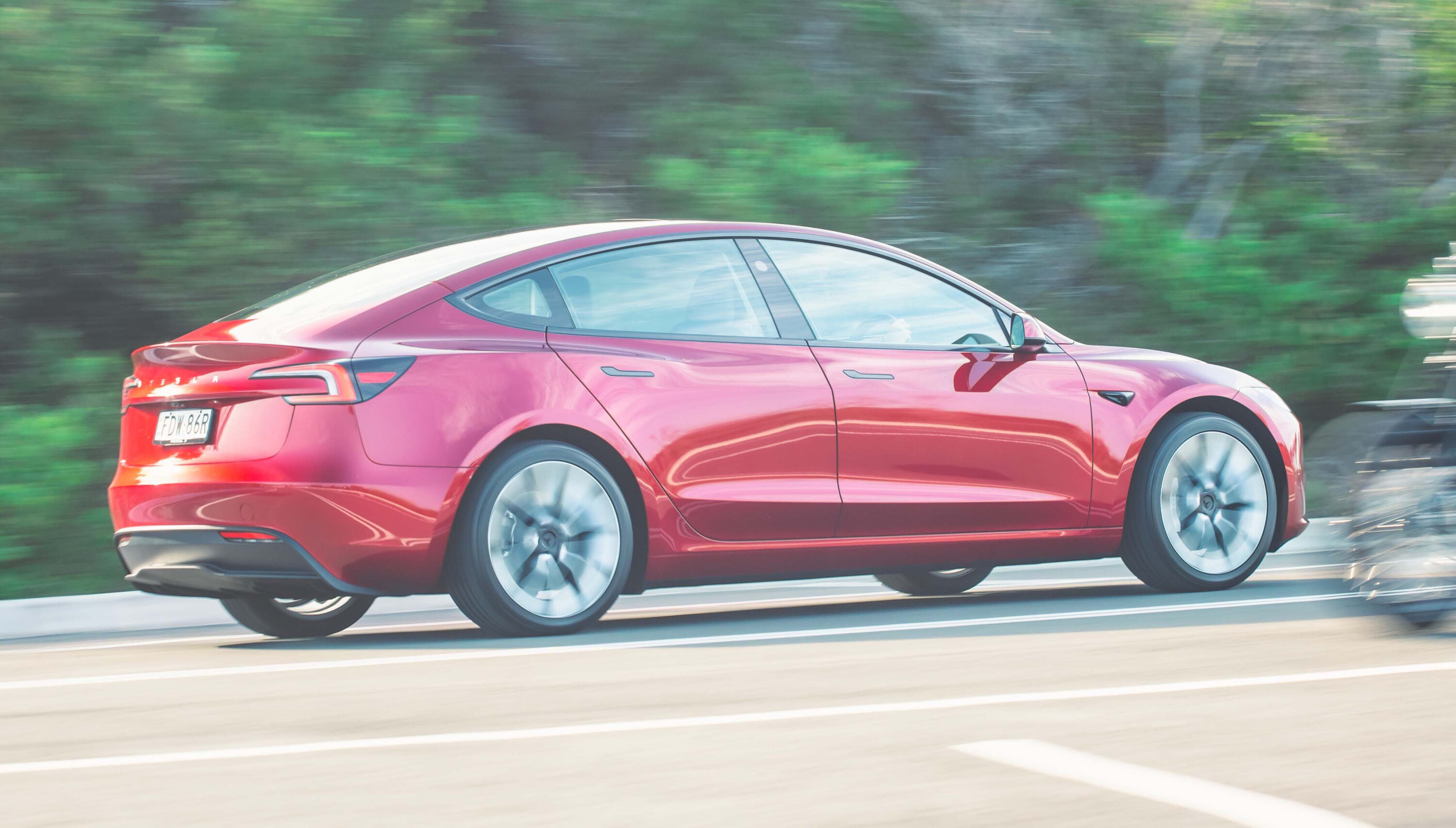
There’s now ventilation for the seats not just heating, and the door armrests are wide, too.
There’s a change to how you get underway in the Model 3. The driver now scrolls up or down a ‘transmission bar’ on the right side of the central touchscreen for Drive or Reverse, respectively. Or, alternatively, there are PRND buttons overhead between the sun visors.
The Model 3 can be instructed to auto-select Drive or Reverse by figuring out you’re likely intended direction, though on one occasion it did select the backwards option despite the presence of a parked car behind!
Cabin refinement is perhaps the most impressive aspect of the Model 3 driving experience, an area further improved with the update.
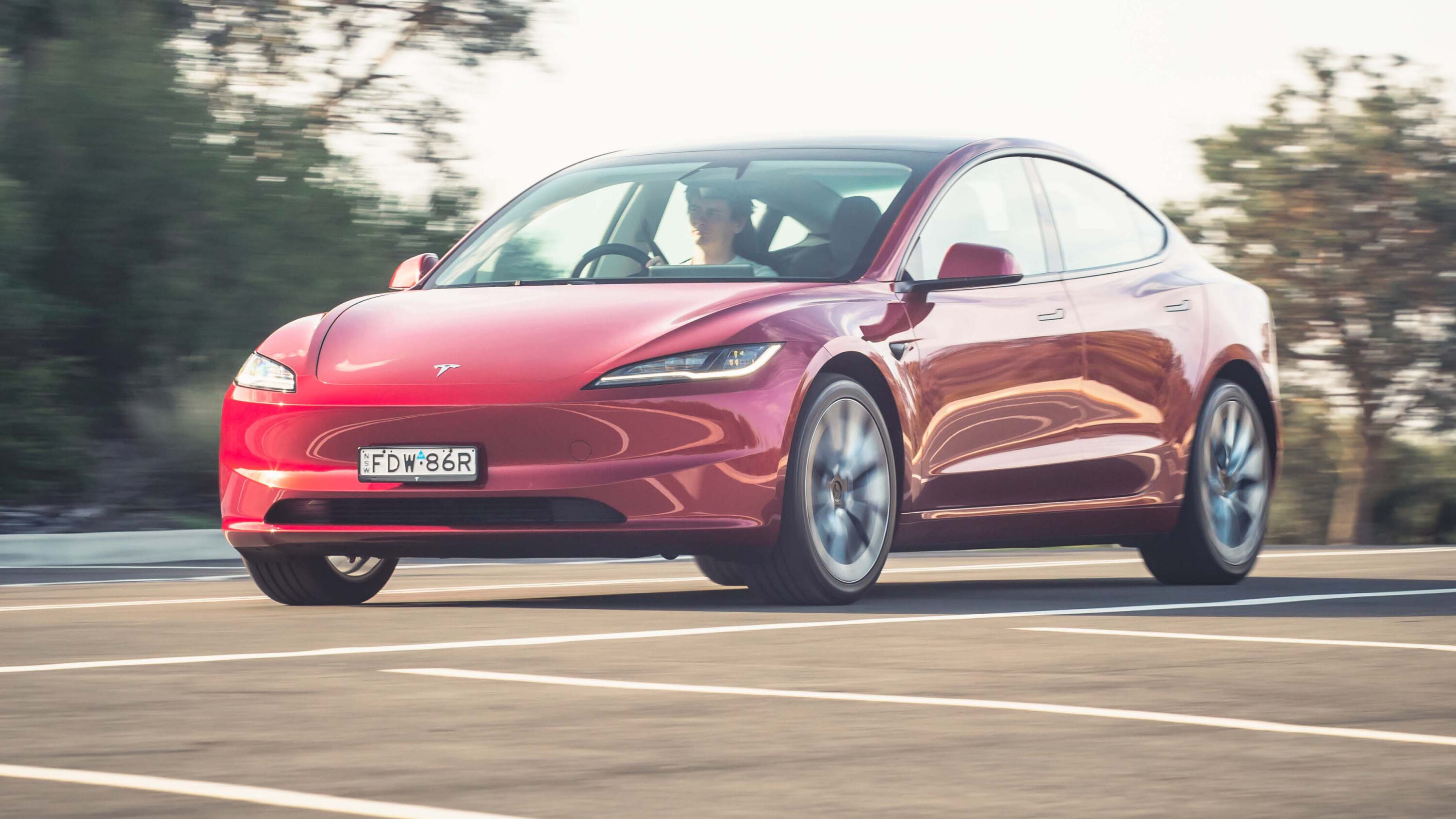
MY24 changes bring double-pane acoustic glass all round including the rear glass, the upper edge of the bonnet has been revised to eliminate buffeting at the base of the windscreen, aerodynamics are improved, and the Model 3 now runs on Hankook’s EV-focused Ion tyres.
The result is a cabin that does a great job of shutting out wind and tyre noise, even at freeway speed and on coarser country-road surfaces.
All key driver info including speed – and Tesla’s unique traffic graphics – remains on the touchscreen. While you get accustomed to it, we think a head-up display would greatly reduce the amount of time the driver’s eyes are averted from the road.
Tesla insiders have admitted the Model 3 previously rode a “little firm”, and its engineers have responded with new front knuckles and bushes, revalved dampers, as well as those Hankook tyres that promise to be more forgiving than the Michelin Pilot Sport 4S sports rubber used previously.
While the suspension has softened and is better over lateral joins for improved comfort, it’s far from fully resolved.
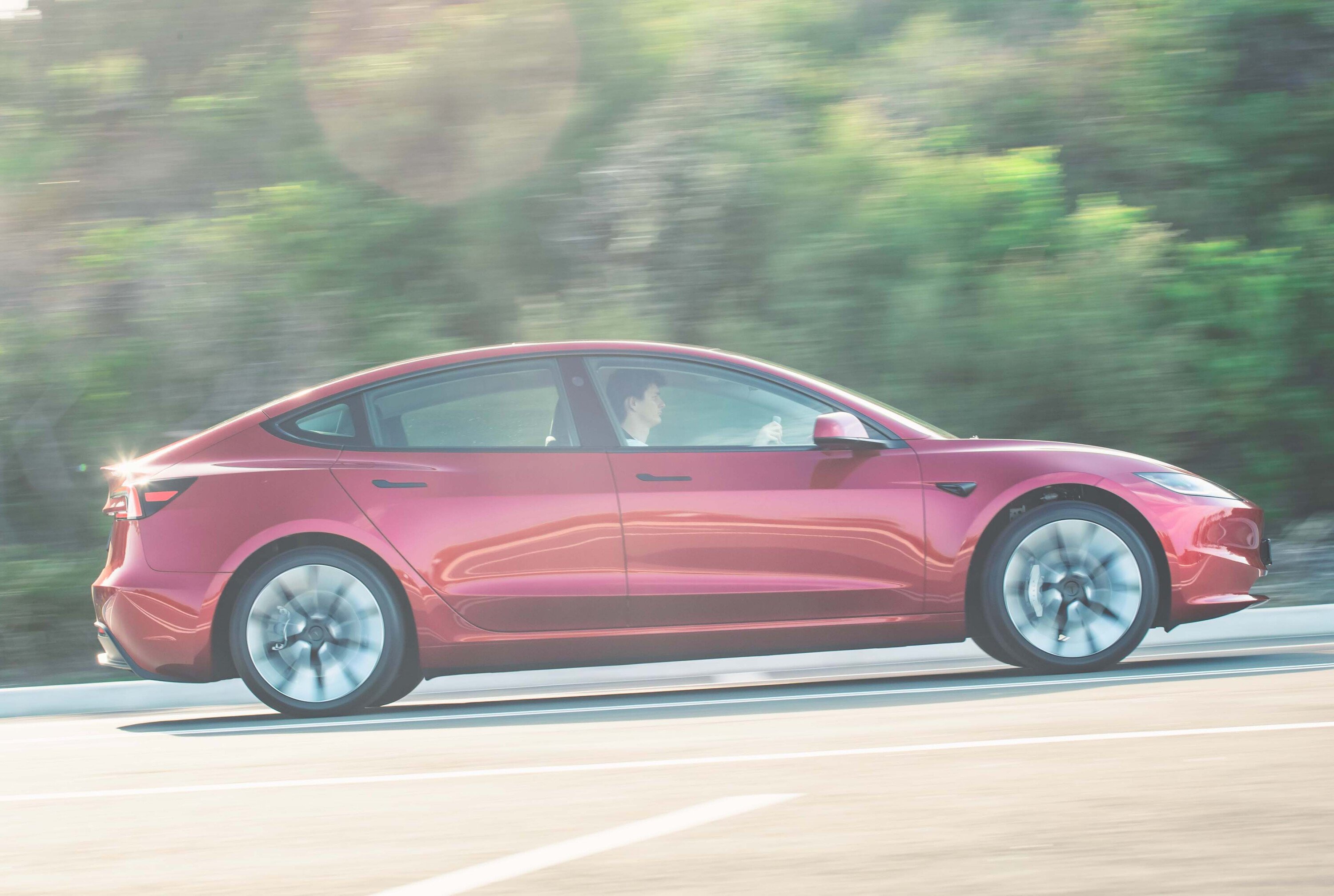
The Model 3 still struggles on uneven roads, with its limited compliance highlighted by excessive body movement, while a tendency to strike its bump-stops made for a noisy suspension.
Our test car was fitted with the optional 19-inch wheels; we’ll have to wait to try the standard 18s to see if this improves things in any way.
The Model 3’s steering remains dartier than expected for a luxury midsized sedan, though equally it continues to lend the Model 3 surprising agility. Some driver-car-road interaction has been lost, however, in the switch from sporty- to eco-focused rubber.
You can change the steering weighting via the touchscreen, though regardless of mode the BMW i4, Polestar 2 and Volvo C40 are all better picks for those who enjoy satisfying weekend drives.
The thick windscreen pillars partially impede forward vision, while the over-the-shoulder view is even more limited.
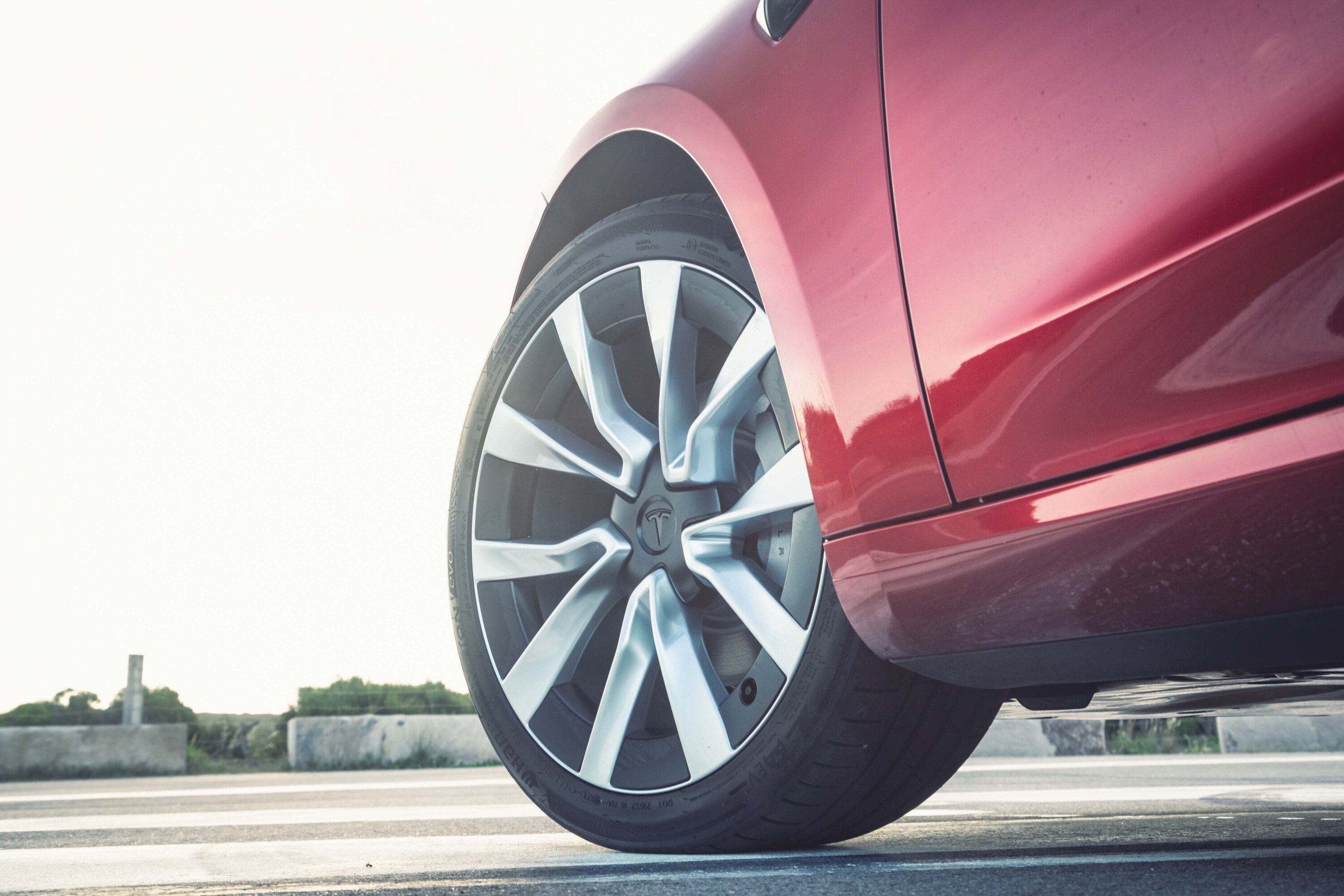
One of the new additions to the touchscreen takes a leaf out of Hyundai and Kia’s Blind Spot Assistance book, with a video image that pops up whenever the indicators are selected.
I still haven’t experienced a better navigation system than Tesla’s – most especially for the size of its map and superbly simple and quick destination search.
Tesla continues to snub Apple CarPlay and Android Auto, which may be frustrating for some buyers while others may think, ‘Who cares?’
If any of the terms in this section have left you scratching your head, these articles will help bring you up to speed!
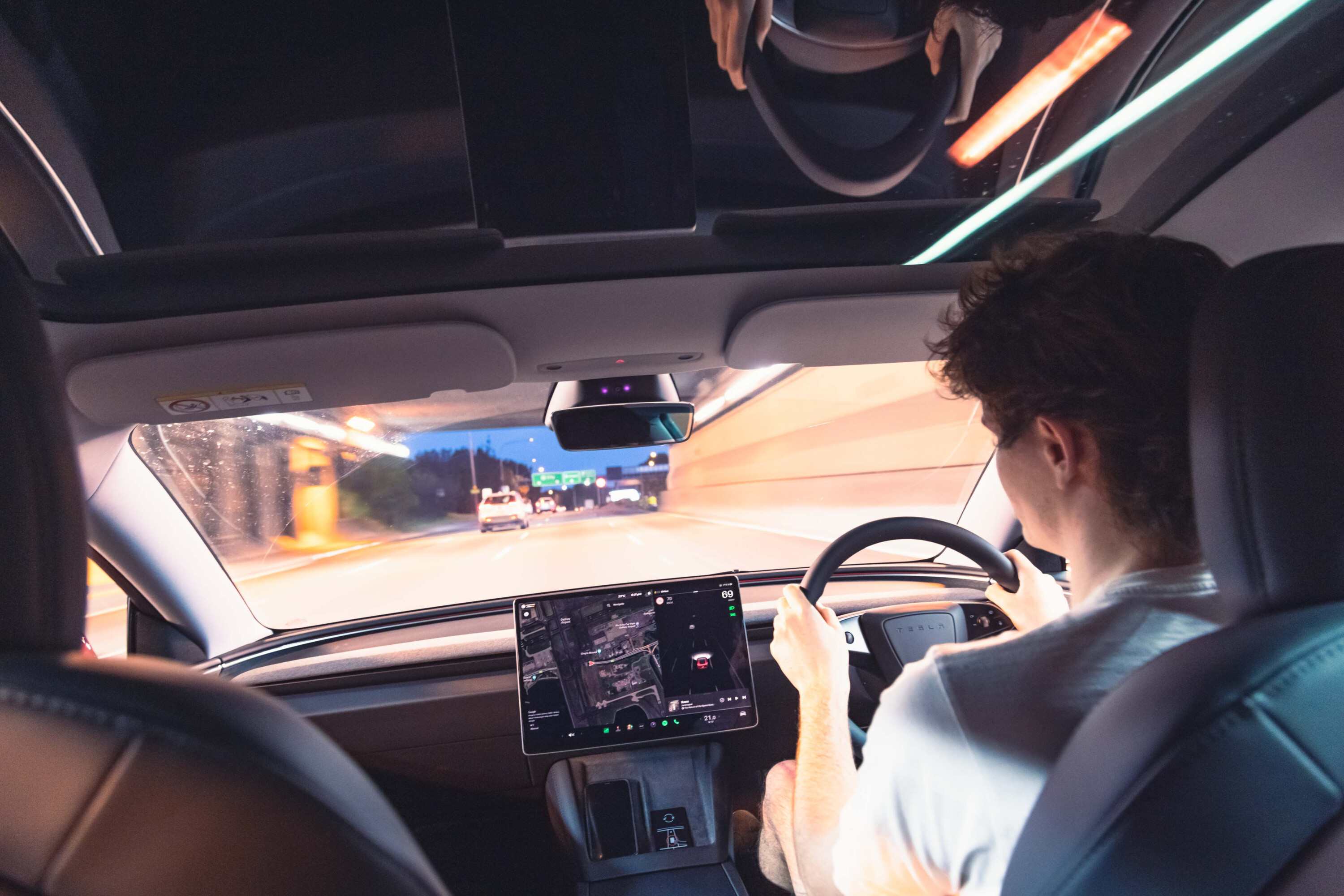
- What is a Powertrain or Drivetrain?
- Power vs torque
- Car suspension explained
- Automatic transmissions (‘gearboxes’) explained
- Chassis control systems explained
- Car vs Ute vs SUV: How the vehicle you buy should guide the way you drive
- What is the WLTP emissions and range test?
An improvement to aerodynamics – down to a low 2.19 co-efficient of drag – has increased WLTP driving ranges without any technical changes to batteries or motors.
The RWD entry model increases by 22km to 513km, and the Long Range increases by 27km to 629km.
That compares with 429km for the base Ioniq 6 (available with a bigger battery and 519km range for additional cost) and 532km for the Polestar 2 single-motor Standard Range that increased its range (and switched from front- to rear-drive) with an MY24 update.
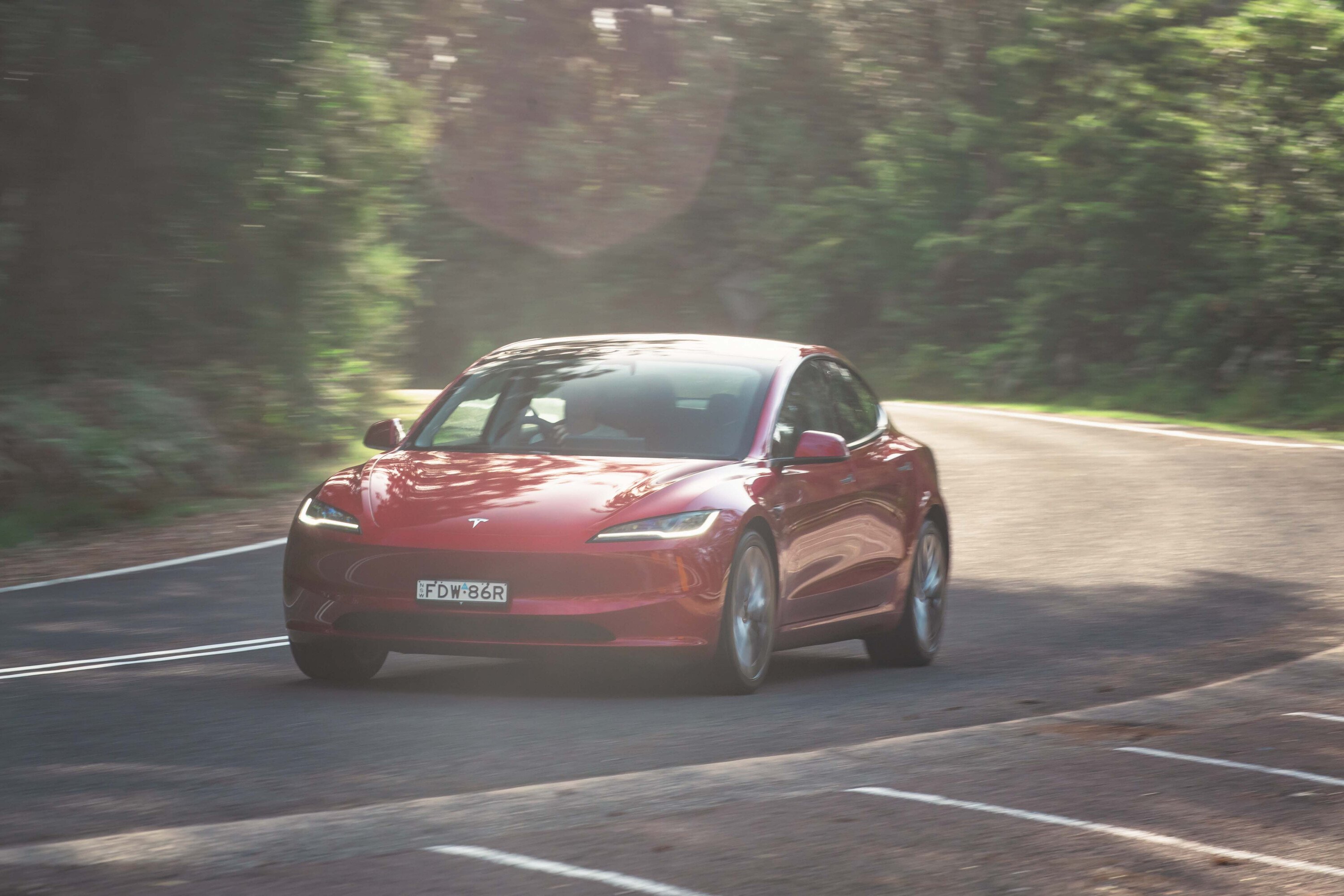
How safe is it?
The Model 3 scored a maximum ANCAP rating when it was crash-tested in 2019.
Its Adult occupant protection and Safety Assist scores were excellent 96 and 94 percent, respectively.
Child Occupant Protection was also a relatively high 87 percent. For Vulnerable Road User Protection, the Tesla was scored 74 percent.
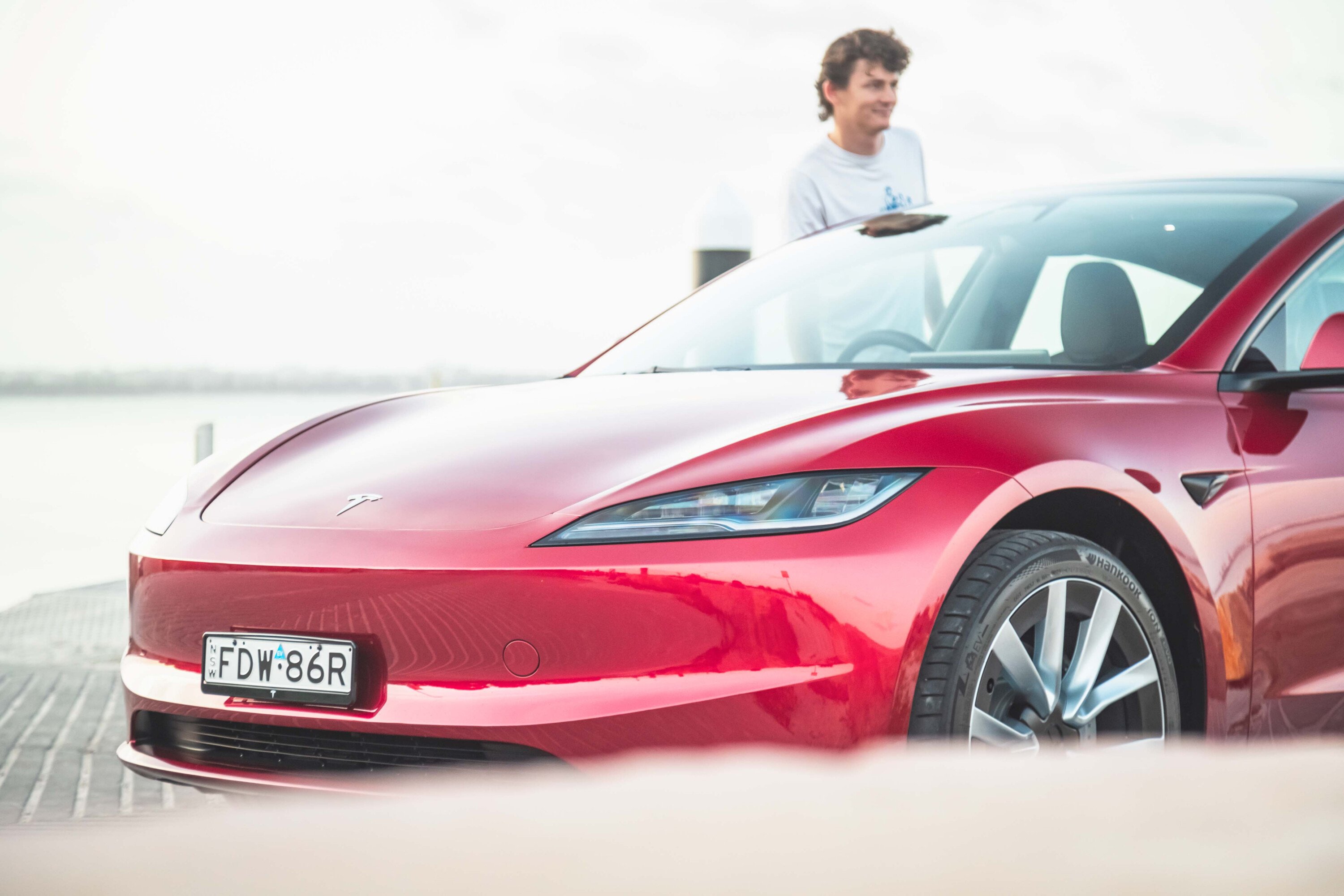
Warranty and running costs
Tesla remains disappointingly short of even the average (five-year) factory warranty length, with only four years (or 80,000km).
The battery and drive units are covered for longer – eight years and either 160,000km or 192,000km depending on the specific model.
There is no scheduled servicing plan with Tesla; owners (or prospective buyers) should check with the company for its recommendations, and where servicing is required as part of certain ownership programs.
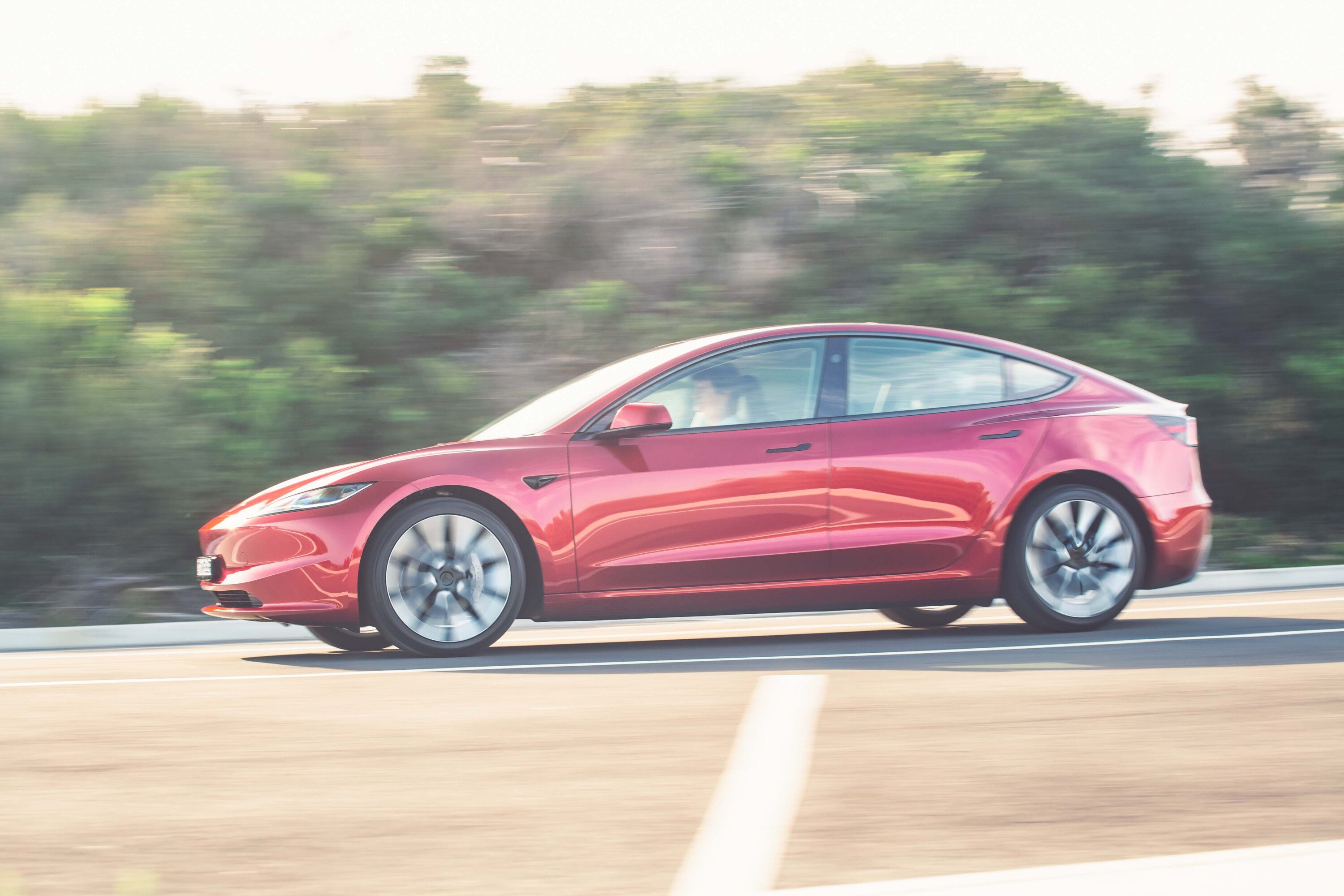
VERDICT
The Model 3’s changes for 2024 may be evolutionary rather than dramatic, but they bring some noticeable improvements – especially in the areas of interior quality and standard features.
If Tesla’s engineers could only properly nail vehicle dynamics to give the Model 3 a consistently smoother ride and make it more fun to drive, this electric sedan would truly be the complete package.
It remains a compelling package, however, and no more so than in this RWD base form we’ve tested here.
The practicality, technology, features, performance and efficiency on offer for the price (as it currently stands) is hard to beat. And that’s with an increasing number of rivals trying to do just that.
Score breakdown
Things we like
- RWD transcends base-model status with quality and features
- Strong, effortless performance
- Cabin noise insulation
- Spacious cabin and plentiful small- and large-item storage
Not so much
- Ride quality improved but still patchy
- Some rivals more fun to drive
- An HUD would still be beneficial
- No spare tyre or repair kit
We recommend
-
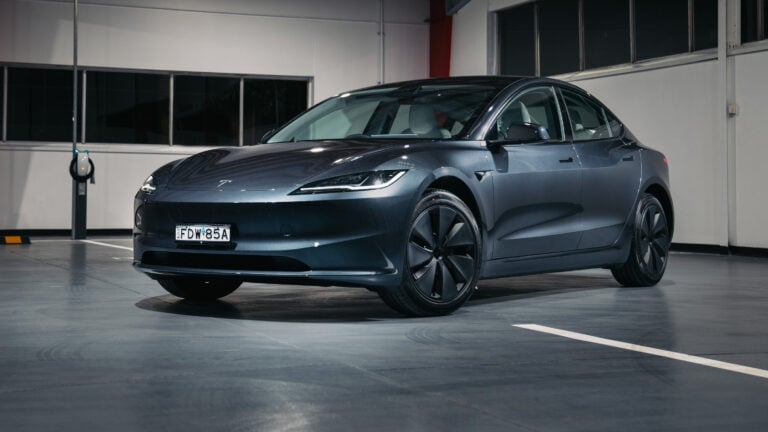 News
News2024 Tesla Model 3 pricing and features
The top-selling Model 3 electric sedan has gained a more Euro-style design, more tech and improved energy efficiency. Here’s the latest pricing and details in Australia
-
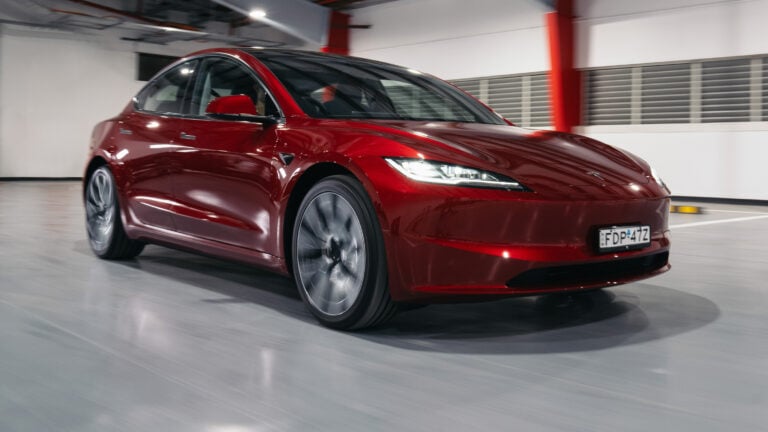 News
NewsTesla confirms new Model 3 Performance for 2024
Launch team for 2024 Model 3 update says go-fast version will be better than before
-
 News
NewsNew car calendar 2026: All the new cars coming to Australia next year
Here’s the WhichCar by Wheels guide to all the new cars that will launch in Australia in 2026. Check back in regularly for updates...


